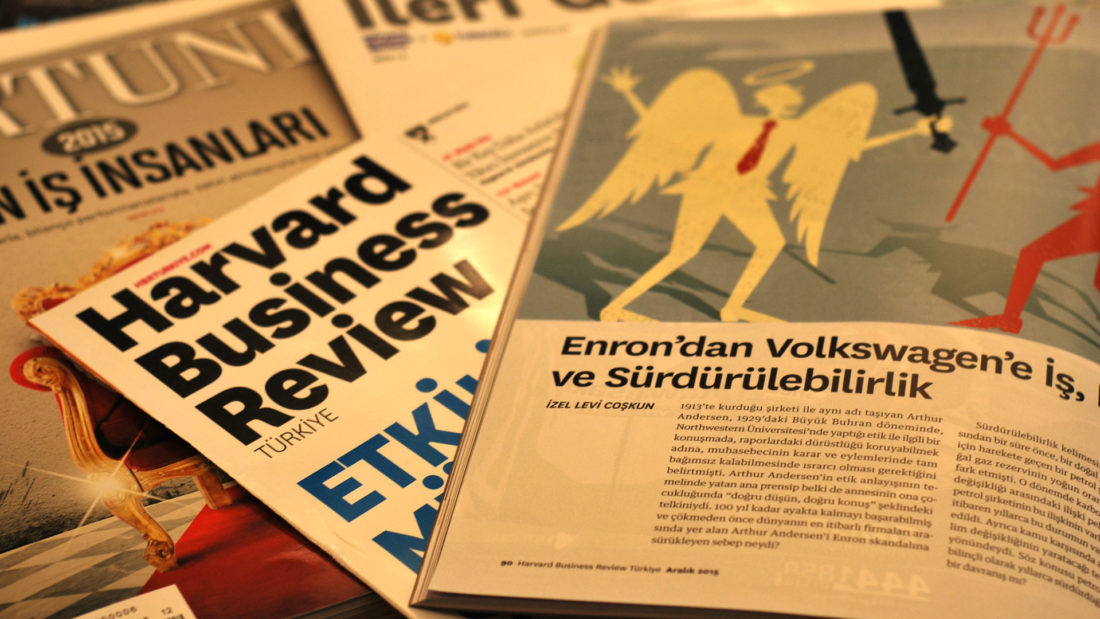Arthur Andersen, who in 1913 founded the firm of Arthur Andersen, said during a lecture on ethics at Northwestern University at the time of the Great Depression of 1929: “To preserve the integrity of the reports, the accountant must insist upon absolute independence of judgment and action.” The core principle underlying Andersen’s understanding of ethics may have been “think straight talk straight” – the very axiom that was imbued in him by his mother. What was it, then, that dragged the century-old firm of Arthur Anderson, once among the world’s most reputable, into the Enron scandal?
ExxonMobil, who made their first move to develop the Natuna gas field off Indonesia in 1981 -some six years before the word “sustainability” was even defined- knew that this immense natural gas reserve was 70% CO2, or carbon dioxide. Back then the connection between carbon emission and climate change was largely unknown. Once Exxon identified such a connection the firm, for many years, funded research that denied the existence of any such connection and publicly refuted the danger that would be caused by global climate change. Do you think Exxon’s deliberate efforts to hide and bend the truth, which went on for years and years, was ethical?
Volkswagen has disclosed to EPA in a press release dated October 15, 2015 that there is additional suspect software in its 2016 diesel models that would potentially help to manipulate the results of the exhaust tests. As you know, it has recently been revealed that the company’s 2009 to 2015 diesel models included the “auxiliary emissions control device” software, which will result in Volkswagen paying billions of dollars in damages. Michael Horn, chief executive of the Volkswagen Group of America, said in a launch speech in New York: “Our company was dishonest, with the EPA and the California Air Resources board, and with all of you and in my German words, we have totally screwed up.” How does one define the ethical standpoint that allowed the CEO of a company, which had for many years occupied a reputable position in the automotive industry with the robustness, performance, reliability and environment-friendliness of their cars, say this?
An e-mail that was sent to Ohio University by Lenny Bernstein, a former in-house climate expert of Exxon, gives a clear answer to this question: “Corporations are interested in environmental impacts only to the extent that they affect profits, either current or future. They may take what appears to be altruistic positions to improve their public image, but the assumption underlying those actions is that they will increase future profits.”
From a corporate point of view, the examples above have a number of problems in common. These are:
1- Profit pressure
2- Targeting continuous growth
3- Unfair competition
4- Ethical egoism
5- Using money as the only measuring tool
Profit Pressure:
Can the sole purpose of a business be making money? It is possible that some- maybe a large group – of people will answer this question, “yes.” In reality businesses have two more purposes: serving the public and being self-sustaining. In my opinion, a successful business is one that has managed to set a balance between all three purposes. The attention that companies pay to social awareness today led to the in the formation of the hybrid company: one creates social benefits while at the same time deriving a profit. In fact, the basic presupposition for both definitions is to ensure that social benefits are made a part of the purpose of a business.
The profit pressure that shareholders and investors put on a company in a global competition environment may lead to the unfortunate conclusion that deriving a profit is more important than creating social benefits. In return companies may, through the use of a variety of channels such as corporate communication, pretend that they attribute great importance to social benefits so as to ensure that their reputation is not damaged in the eyes of the public because of that unfortunate conclusion. Doing so may mean the beginning of an end. A small step to bend the truth once may pave the way to a series of lies that can potentially destroy a company.
Targeting Continuous Growth:
A very simple equation: is it feasible to ensure infinite growth in a finite world?
How ethically acceptable is a model which grows by promoting continued consumption and which increases business assets while growing but which also flagrantly destroys resources, causing stakeholders, the environment and the public to pay a heavy price? How ethical and sustainable is it to turn wars, diseases or environmental problems into production and services to further accelerate the wheels of growth and consumption?
I believe that any giant corporation that overgrows to such an extent that they become able to direct country politics and which, in a way, kills any chance of survival for local businesses through global expansion, suffers from serious management problems. Yes, the financial-statement-based reporting structure of such giant corporations can be monitored to some extent by means of ERP, internal control systems, internal and external independent auditing mechanisms but their top decision mechanisms, which cannot be monitored in the same manner, may contain some flaws. In addition, I believe that another important contributor to the fallibility of decisions is the lack or insufficiency of communication between management and local branches of a corporation, which is such a wide topic that it deserves another article. The incredible amount information that individual managers or the members of the executive board or the board of directors need to be provided with is truly beyond human capacity to take in. Since this is the case, these individuals are having to make their decisions based on the restricted information presented to them, which results in making errors- especially in corporations whose field of responsibility and accountability run across continents.
Unfair Competition:
According to Porter, an organisation can achieve competitive advantage through attribute(s) that allow it to outperform its competition. The two types of competitive advantage that Porter defines are differentiation and lower cost. I believe that businesses end up having to come-up with solutions that go far beyond the limits of these two strategies in competing with penetrating rivals while battling with the threat of substitution and the bargaining power of customers. This takes us to the concept unfair competition, which can be defined as “abuse of economic competition through deceptive practices or any other outside-good-faith means.” The cases of Mercedes bribing officials in 22 countries to do business and Nike using child labour in the Middle East are among the worst and the most extreme cases that show us the possible consequences of unfair competition. Why else would there have been the need to draft a “UN Global Compact”, which contains 10 principles on human rights, worker’s rights, anti-corruption and environmental issues in order for corporations to understand, support and enforce for sustainable development. The principles set out in the compact include ones on highly important issues such as the effective abolition of child labour; working against corruption in all its forms, including extortion and bribery; making sure that businesses are not complicit in human rights abuses and supporting a precautionary approach to environmental challenges. Did Volkswagen’s management think that the following principle, which states “Businesses should encourage the development and diffusion of environmentally friendly technologies,” was too costly to enforce under competitive conditions? Could Exxon have created a good brand reputation story by sharing what it had hidden to achieve a competitive edge for itself and its industry? Doesn’t the concept of “fair trade”, -a social movement- aim to support sustainability and to protect producers from unfair competition?
Ethical egoism:
The Turkish Dictionary offers the following definitions for the word “ethics”: in business, principles of conduct whereby all parties should abide” and “moral or relating to morality.” Ethical egoism, on the other hand, is defined as “The morally right act, for any particular situation, is the act that will produce the greatest amount of utility (or the least amount of disutility) for oneself.” This is based on the principle of trying to maximise one’s own interests (or minimise own loss) under all circumstances.
The understanding of ethics may change from one region or country to another depending on the different moral values they may have. I do not think that it is possible for a global corporation to set up a structure that can combine the ethical values of all the regions it operates in, nor one that can meet all ethical expectations at once. The method of reasoning one should adopt at this point should, in my opinion, be inductive rather than deductive. Just like we have seen the case of Arthur Andersen, a simple and basic ethical value can be used to derive general principles without necessarily causing any confusion. Do you think Arthur Andersen was able to hold on to the basic value(s) given its ethical egoism- in addition to the growth and profit pressure that prevailed in the industry?
Using money as the only measuring tool in financial statements
Luca Pacioli, the mathematician who defined the basic principles of accounting as well as mathematical theorems in his book of 1494, warned that a person should not go to sleep at night until the debits equalled the credits. Today, on the other hand, debits equalling credits is not sufficient to warrant a good night’s sleep as businesses now have to factor in something which is more important and which cannot be measured with money: social and environmental impact. Social and environmental impacts, which have traditionally been described as economic externalities, have now been rendered scalable through the use of sustainability reports. It looks like the integration of these reports into financial statements will end the monopoly of money on measurement. In fact, a large number of businesses have already adopted integrated reporting. However, the use of integrated reporting by businesses is not enough to fulfil the objective: financial statement readers and, most particularly, consumers must have a raised awareness about the issue. Before anything else, we must accept that there are “non-monetary” scalable factors that can impact the decisions and abandon some of our centuries-old habits.
At the same time I notice that we are beginning to see that the solution to the problems which I explained above and which emerged in a variety of areas, do not lie with a capitalism-based global economy, unfortunately.
Sustainability, which is defined as “meeting the needs of the present without compromising the ability of future generations to meet their own needs,” offers corporations a different framework for corporate responsibility and accountability. I believe this framework can, in many respects, offer solutions to the problems that are caused by the existing system.
The latter part of the above definition, which is “compromising the ability of future generations to meet their own needs,” cannot be addressed with a management approach that is limited to one’s lifetime, or to any other time limitation for that matter. This statement should not be interpreted as an advice to encourage managers to manage for a lifetime. What it means is that businesses should, at the beginning, create a value that is compatible with the definition of sustainability and work to maintain that value in the long run. In other words, the purpose when establishing a business should include social and environmental responsibility and short-term decisions should not be allowed to affect the core principle for or, raison d’être, of the business. Of course, when it comes to ethics, not everything will be as clear-cut as I have explained in this article. For example, the fact that fossil fuel causes global warming is new information. As in the case of the oil company, a value whose purpose to once seemed perfectly ethical may be viewed quite differently at a later time. However, choosing to hide the truth rather than transforming when a new understanding of ethics emerges that challenges the purpose of a business will, without any doubt, have negative impact on the interests of future generations.
The definition of sustainability transforms a consumption-based economic model that places “self-interest” in the centre into a model that “spreads & shares value added universally”, allowing stakeholders, nature and the social environment to benefit from it. In my opinion, the outcome of this new model allows multiple-gain utilitarianism and care ethics to unite- as opposed to one-sided ethical egoism. At this point, I find it useful to provide a brief explanation of utilitarian ethics and care ethics, which are built on two completely different pillars. Utilitarianism is a consequentialist theory, which focuses on the outcome of actions. According to this theory, the best action is the one that maximises utility. The intensity, duration, certainty and propinquity of an action make up four sides of this theory. Utilitarianism, which is based on the idea that actions have morally important consequences and that actions must ensure maximum utility, can best be observed today in the areas of health and social policy. Care ethics, which was founded by Carol Gillian in early 1980s, talks about a feminine aspect, unlike any other theory, and that such care-based relations between humans underlie such femininity. The most significant difference between these two theories is that utilitarianism talks about universally accepted moral principles whereas ethics of care adopts particularity with regard to morals. There is no room for emotions in utilitarianism as it is based on reason whereas care ethics takes into account the connection between individuals and the transfer of emotions.
I gave the above explanation in order to be able to ask these simple questions: Had Arthur Andersen been able to place social benefit and professional care in the centre of the firm’s actions and spread that across the firm, would the Enron scandal have occurred? Had Exxon seen nature as one of its stakeholders and included it in its field of interaction, would they have invested all that money and time spent on hiding the truth in changing their production technology 35 years prior? Likewise, can corporations get outside the competition loop when they are able to see their rivals are stakeholders? Would not seeing rivals as stakeholders bring us closer to the word “river,” the etymological root of the word “rival;” and to the original, 16th century meaning of the word, which is “one who uses the same stream?”
What is critically important at this point is to make sure that the sphere of impact of decisions is calculated down to the last detail. In fact, one might be tempted to think that there will be no end to such a calculation. However, trying to address this process from the beginning will surely take us to a better place than the one we are currently in. When I talk about “spread & share universally” I include all stakeholders, employees, clients, suppliers, public and nature. The process I have mentioned above does not start with the placement of an order, nor does it end at profit generation. It has a much broader meaning than that; it encompasses a wide range of factors including how demand was created, production is done; how money is earned and what the price for the public and nature is. If you ask me, the compensation payment that Volkswagen will make, will not be the end of the process. Do other carmakers use similar software? Since we are talking carbon emission, if the money that Volkswagen will pay was to be used for environmental purposes, would that maximise use or remedy the damage- at least partially? If there are other car manufacturing companies that use similar software and if they also pay money in compensation, will that eliminate the yet-to-be-solved solved carbon emission problem? Can the compensation payment be turned into an R&D fund that will gather other manufacturers under an umbrella of open innovation? I believe that in addressing this matter both its long-term effects and its impact on each stakeholder must be taken into account. One other such example is the possibility of creating a platform of debate where the effects -pros and cons- of Arthur Andersen leaving the industry can be discussed in terms of the ethical problems that occurred due to the monopolisation of the remaining auditing firms.
Another concept, which exists in harmony with the definition of sustainability, is the respect for what is “local.” The consumption habits of today lower the financial cost of being an economy of scale as a result of globalisation, while at the same time laying onto society and nature the portion of the burden, which belongs to so-called non-scalable externalities. In doing so, the “local” is destroyed by ensuring that uniformisation seems beneficial. Being similar, uniform, adopting similar habits in different regions and creating a target audience surely makes it easier and less costly for businesses to shape and manage the demand for certain products and services. However, are we aware that we are damaging the local and destroying our own future while seeking to go global? Are we aware that the delusion that the desire to grow, as caused by going global, is far more important than maintaining “the local” means denying the indispensable connection between all living and non-living beings?
This is why sustainability prefers “development” over “growth.” Economic growth, for instance, is concerned with income increase through production and uses money as its quantitative measurement unit. Countries define growth in terms of the increase in national income. Corporations define growth in terms of the increase in turnover. This shows that growth is a quantitative concept. Development, on the other hand, is qualitative. It is interested in the investment made in humans and the environment. Development in the context of businesses encompasses a number of factors such as institutionalisation and quality of production; added value, capacity for innovation and efficiency. In the context of nations it includes factors such as the standard of living and level of education of the people; proliferation of healthcare services; lower unemployment rates; social security and protection of the environment as well as cultural, artistic and historical assets. Therefore development does not always depend on growth. It may or may not bring about growth. Based on this explanation, can you see the enormity of the danger that companies that define growth – as opposed to development – as their sole target pose not only for themselves but also for the environment and society? Do you see what kind of a disaster loop we are lost in when we disregard social and environmental impacts and use money as the sole device for measurement while continuously increasing assets for the love of growth? Sustainability reports, which blend and turn into corporate information the many elements of development including carbon emission, have emerged to ensure that companies inform the public about corporate development. Integrated reporting is a new type of reporting which combines financial statement data with the contents of the sustainability report and which then analyses the correlation between them. The main principle of integrated reporting is that the use of financial data as the only measurement tool cannot adequately assess the success or performance of a business.
The last words come from Jose Mujica, president of Uruguay: “When you buy something, you are not buying it with money, in fact you are buying it with the part of your life that you spent earning that money”.




No Comment